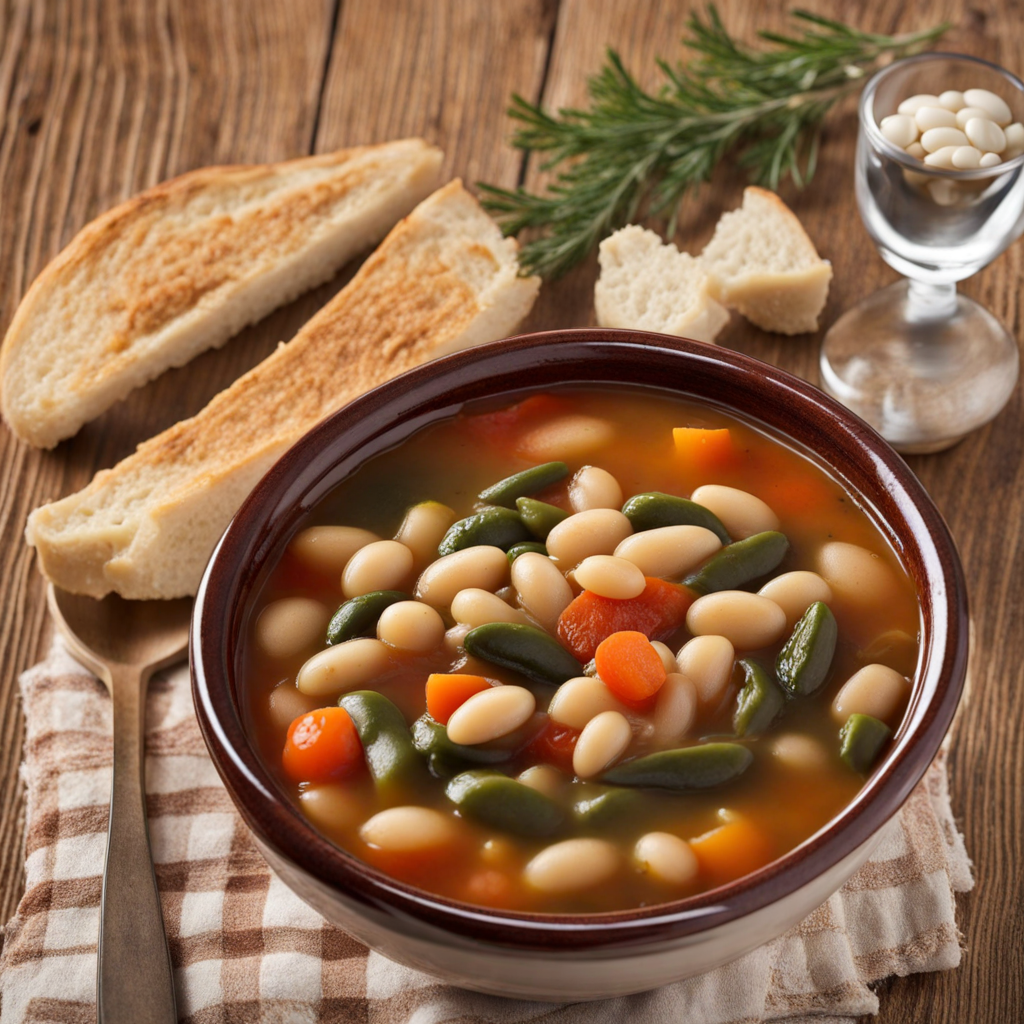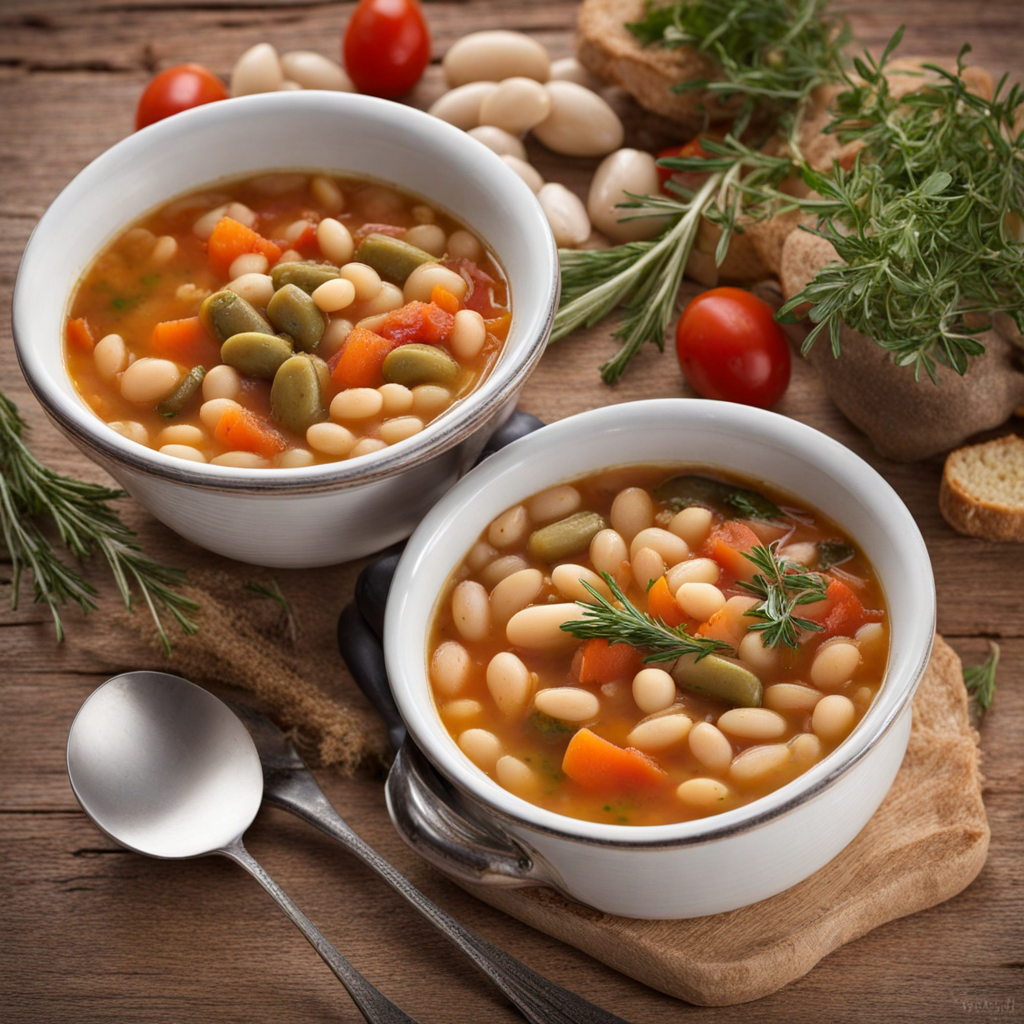Fasolada
Fasolada is a traditional Cypriot dish that embodies the heart of Mediterranean cuisine with its wholesome and hearty ingredients. This rustic bean soup is primarily made with plump white beans, which are simmered to perfection, creating a creamy and comforting base. The beans are complemented by a medley of fresh vegetables, such as ripe tomatoes, carrots, celery, and onions, which not only enhance the flavor but also add a vibrant color to the dish. The combination of these ingredients results in a rich, nourishing soup that is both satisfying and healthy, making it a staple in Cypriot households. The flavor profile of Fasolada is both simple and delightful, relying on the natural sweetness of the vegetables and the earthiness of the beans. Olive oil is generously drizzled into the mix, infusing the dish with a fruity richness that elevates the overall taste. Additionally, a blend of herbs and spices, such as oregano, bay leaves, and sometimes a hint of garlic, rounds out the flavors, creating a well-balanced and aromatic experience. Each spoonful offers a comforting warmth, transporting you to the sun-soaked shores of Cyprus with every bite. Often enjoyed as a main course, Fasolada is not just a meal but a reflection of the local culture and culinary traditions. It is commonly served with a side of crusty bread, perfect for dipping into the thick, savory soup. This dish is not only a delicious way to enjoy a variety of wholesome ingredients but also a beautiful representation of communal dining, where families gather to share and savor the flavors of their heritage. With its hearty nature and vibrant taste, Fasolada invites anyone looking to explore new culinary adventures to indulge in a piece of Cypriot comfort food.
How It Became This Dish
The History of Φασολάδα: A Culinary Treasure from Cyprus Φασολάδα, a hearty bean soup, is not merely a dish; it is a culinary emblem that encapsulates the rich history, cultural significance, and evolving traditions of Cyprus. This simple yet nourishing meal has roots that stretch deep into the Mediterranean, reflecting the island's agricultural practices, social customs, and historical influences. #### Origins of Φασολάδα The origins of Φασολάδα can be traced back to ancient times when beans were among the first domesticated crops in the Mediterranean region. Archaeological findings suggest that legumes, including various types of beans, were cultivated in Cyprus as early as the Neolithic period (circa 8500–6000 BCE). The Greeks, who settled on the island, brought with them a culinary tradition that revered beans not only for their nutritional value but also for their versatility in cooking. The term "φασόλι" (fasóli) itself is derived from the ancient Greek word "φασόλιον" (phasolion), which referred to beans. As the island's cultural landscape evolved, so too did the ways in which beans were prepared and consumed. By the time of the Byzantine Empire, beans had become a staple food, valued for their affordability and sustenance, especially among the working class. #### Cultural Significance Φασολάδα is more than just a dish; it is a symbol of Cypriot identity and communal life. Traditionally, it is made from a base of white beans, often combined with tomatoes, olive oil, onions, and various herbs. This combination not only reflects the agricultural bounty of Cyprus but also the Mediterranean diet's emphasis on fresh, local ingredients. The dish is often associated with the Greek Orthodox fasting periods, where the consumption of meat is restricted. During these times, Φασολάδα serves as a vital source of protein and energy, allowing communities to come together over a shared meal. It embodies the values of simplicity and abundance, highlighting how humble ingredients can create something nourishing and deeply satisfying. In Cypriot culture, food is intrinsically linked to hospitality and community. Φασολάδα is frequently served at family gatherings, communal feasts, and during special occasions, reinforcing bonds between friends and family. The act of preparing and sharing this dish is a ritual that transcends generations, connecting the past with the present. #### Development Over Time As Cyprus has seen various rulers throughout its history—from the ancient Greeks and Romans to the Ottomans and the British—its culinary landscape has been shaped by these influences, leading to variations in traditional recipes. The Ottoman period, in particular, had a profound impact on Cypriot cuisine, introducing new spices and cooking techniques. By the 19th century, Φασολάδα had firmly established itself as a staple of Cypriot homes. The dish adapted to the changing agricultural practices and availability of ingredients. For instance, while the basic recipe remains consistent, the addition of local herbs like parsley and dill, or the inclusion of other vegetables such as carrots and celery, reflects regional tastes and agricultural shifts. The rise of urbanization in the 20th century also transformed how Φασολάδα was perceived and consumed. As people moved to cities, the dish became a popular offering in tavernas and restaurants, catering to both locals and tourists. This shift helped to elevate Φασολάδα from a humble home-cooked meal to a celebrated culinary experience, showcasing the island's rich gastronomy. In contemporary times, the dish has seen a revival among younger generations who are keen on preserving traditional recipes while experimenting with modern interpretations. Chefs and home cooks alike have begun to explore alternative beans, such as black-eyed peas or lentils, while also making the dish vegan-friendly by eliminating animal products altogether. #### Modern Interpretations and Global Influence Today, Φασολάδα continues to be an integral part of Cypriot cuisine, enjoyed in homes and restaurants alike. It is often served with a drizzle of high-quality Cypriot olive oil and a sprinkle of fresh herbs, enhancing its flavor profile. The soup is usually accompanied by crusty bread, which is perfect for dipping, and sometimes paired with a side of pickled vegetables or olives. As the global interest in Mediterranean diets has grown, Φασολάδα has gained international recognition, appearing on menus beyond Cyprus. Food enthusiasts and chefs worldwide have embraced the dish as an emblem of healthy eating, emphasizing its plant-based ingredients and wholesome qualities. Social media, too, has played a role in the resurgence of interest in traditional Cypriot dishes like Φασολάδα. Food bloggers and influencers showcase their own takes on the recipe, often incorporating personal touches or contemporary twists. This digital age has allowed for a broader sharing of cultural dishes, fostering a greater appreciation for the culinary heritage of Cyprus. #### Conclusion Φασολάδα is more than a simple bean soup; it is a narrative of Cyprus itself—a story woven through time, culture, and community. From its ancient origins to its modern adaptations, the dish reflects the resilience and creativity of the Cypriot people. It serves as a reminder of the island's agricultural roots, its historical influences, and the importance of shared meals in fostering connections among families and communities. As we continue to explore the culinary treasures of the world, Φασολάδα stands out not only for its delicious flavor but also for its rich history and cultural significance. It is a dish that invites us to gather, to share, and to celebrate the simple joys of life—one bowl at a time.
You may like
Discover local flavors from Cyprus







